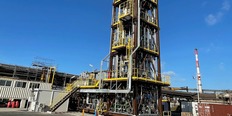- Project launched in May 2019 with a duration of 48 months.
- Estimated eligible costs are €19.2m with €14.7m funded by the EU.
- The pilot will capture 0.5 tons of CO2 per hour, totaling over 4,000 tons annually.
- Twelve partners from six European countries are involved.

Project Overview
The "3D" industrial pilot for capturing CO2 from industrial activities is operational at ArcelorMittal’s Dunkirk site. Supported by the EU’s Horizon 2020 program, the project aims to validate replicable carbon capture solutions. The consortium includes TotalEnergies, ArcelorMittal, Axens, and IFP Energies Nouvelles (IFPEN), targeting decarbonization in CO2-intensive industries like steelmaking.
Final Stage Before Full-Scale Deployment
The pilot aims to make carbon capture processes more competitive and less energy-intensive. It will verify the performance of the DMXTM carbon capture process developed by IFPEN over the past decade. Launched in May 2019, the demonstrator's construction began in 2020 under Axens’ supervision. The main modules, including a 22-meter tower, were delivered and assembled by December. The unit is now ready for start-up, with the demonstration phase scheduled to last 12 to 18 months.
Performance Demonstration
The facility will process steelmaking gases, demonstrating the effectiveness of the carbon capture process by separating CO2 from other gases. During the demonstration, it will capture 0.5 tons of CO2 per hour, amounting to over 4,000 tons annually.
Collaborative Effort
The project involves twelve partners from research and industry across six European countries, including ArcelorMittal, IFPEN, Axens, TotalEnergies, and its affiliate GreenFlex, ETH, DTU, AirProducts, John Cockerill, Gassco, Brevik Engineering, and Seqens. It also has two sponsors: Suez and Lhoist.
Key Figures
Key figures for the project include its launch in May 2019, a 48-month duration, estimated eligible costs of €19.2 million, and EU funding of €14.7 million.

